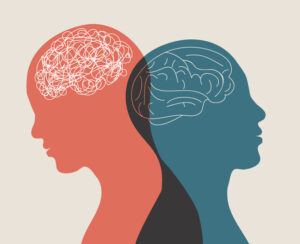Schizophrenia is a mental health condition that changes the way people think, feel, and understand the world. It can make it hard to tell what is real and what isn’t. People with schizophrenia might hear or see things that aren’t there or believe things that aren’t true. It’s a serious condition, but with treatment, people can live better lives.
What Are the Symptoms of Schizophrenia?
There are three main types of symptoms:
- Positive symptoms: Seeing or hearing things that aren’t there (hallucinations) and believing things that aren’t true (delusions).
- Negative symptoms: Losing interest in things, showing little emotion, or avoiding people.
- Cognitive symptoms: Problems with memory, focusing, or organizing thoughts.
These symptoms can look different for each person and may come and go.
How Is Schizophrenia Different From Other Mental Illnesses?
Schizophrenia is often mixed up with other mental health problems, like bipolar disorder or depression. While bipolar disorder causes mood swings, schizophrenia affects thinking, feeling, and behaving. Schizophrenia symptoms last longer and need ongoing treatment.
What Causes Schizophrenia?
We don’t know exactly what causes schizophrenia, but it’s often a mix of things:
- Family history: If someone in your family has schizophrenia, you might have a higher chance of getting it.
- Environment: Problems during pregnancy, childhood trauma, or stress might play a role.
- Brain changes: Differences in brain chemicals and structure also seem to be connected.
Can Schizophrenia Be Cured?
There is no cure for schizophrenia, but treatment can help control the symptoms. With the right care, many people can feel better and live a good life.
How Is Schizophrenia Treated?
Treatment usually includes:
- Medication: Antipsychotic drugs help reduce hallucinations and delusions.
- Therapy: Talking to a therapist (psychologist, clinical social worker, or counsellor) can help people deal with their thoughts and emotions.
- Support services: Programs can help with housing, jobs, and daily skills.
Sticking to treatment and seeing healthcare professionals regularly is very important.
Can People With Schizophrenia Live a Normal Life?
Yes, with treatment and support, many people with schizophrenia can work, make friends, and enjoy life. Having a supportive family or community helps a lot.
What Triggers Schizophrenia Symptoms?
Certain things can make symptoms worse, like:
- Stressful events, like losing a job or a loved one.
- Using drugs, especially marijuana or methamphetamine.
- Not sleeping well or major changes in routine.
Learning about triggers can help people avoid them.
Is Schizophrenia Dangerous?
Most people with schizophrenia are not dangerous. However, untreated symptoms, like severe delusions, can lead to risky behaviour. Getting treatment reduces this risk and helps people feel safer and more in control.
How Can Someone With Schizophrenia Be Supported?
Family and friends can help by:
- Learning about schizophrenia to better understand what their loved one is going through.
- Encouraging treatment and helping with reminders for medication or therapy appointments.
- Being patient and offering emotional support, especially during tough times.
What Is the Role of Mental Health Professionals?
Doctors and therapists (psychologists and social workers) are key to helping people with schizophrenia. They create a plan for treatment, give emotional support, and connect people to helpful programs for housing or jobs.
Conclusion
Schizophrenia is a serious condition, but people with it can still live meaningful lives with the right care and support. Showing kindness, learning about the illness, and breaking the stigma can make a big difference.
If you’ve been feeling confused, hearing or seeing things that others don’t, or struggling to tell what’s real, know that you’re not alone. These feelings can be overwhelming, but support is available, and things can get better, and we are here to support you.
Author: Nenad Bakaj, MHumServ (RehabCouns), BSocWk, DipAppSci (Comm&HumServ), AMHSW, MAAC, MAASW, JP (Qld)
Nenad Bakaj is a Brisbane based Clinical Counsellor, Accredited Mental Health Social Worker, Life Coach and Bigger Bite Out Of Life Trainer with a keen interest in positive psychology, mental health and wellbeing, and is continually developing his professional skills and knowledge. Nenad enjoys working with adolescents and young adults, as well as older clients, and feels it is a privilege to be able to support them.
To make an appointment with Nenad Bakaj, try Online Booking. Alternatively, you can call Vision Psychology Brisbane on (07) 3088 5422 or M1 Psychology Loganholme on (07) 3067 9129.
References
1. American Psychiatry Association. (2024). What Is Schizophrenia? Retrieved from Psychiatry.org – What is Schizophrenia?
2. Andreasen, Nancy C. (1984). The Broken Brain: The Biological Revolution in Psychiatry. Harper & Row.
3. Mueser, Kim T., and Susan Gingerich. (2006). The Complete Family Guide to Schizophrenia: Helping Your Loved One Get the Most Out of Life. Guilford Press.
4. Royal Australian and New Zealand College of Psychiatrists. (2016) Clinical practice guidelines for the management of schizophrenia and related disorders. Retrieved from schizophrenia-cpg.pdf
5. Torrey, E. Fuller. (2020). Surviving Schizophrenia: A Manual for Families, Patients, and Providers. HarperCollins.
